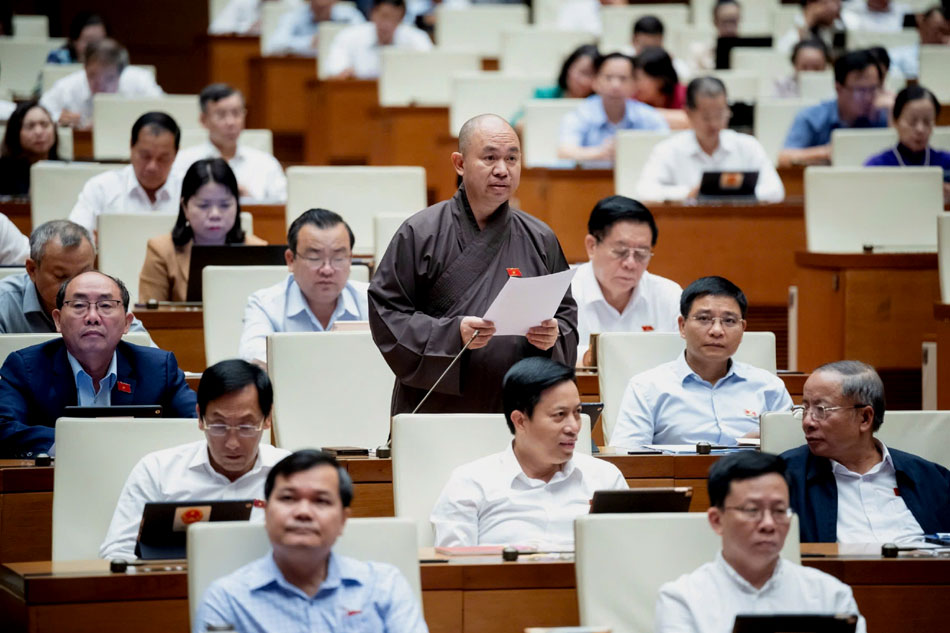He made this proposal during the plenary discussion on the draft amendment to the Cultural Heritage Law at the 8th session of the 15th National Assembly on Wednesday evening.

Most Venerable Thích Đức Thiện, National Assembly delegate from Điện Biên Province, contributes his opinions on the draft amendment to the Cultural Heritage Law.
According to Most Venerable Thích Đức Thiện, establishing a cultural heritage preservation fund to support related activities is essential.
Currently, Việt Nam has over 40,000 tangible heritage sites, 70,000 intangible cultural heritages, 15 UNESCO-recognised cultural heritages, and 9 documentary heritages. These are both a source of national pride and a vital resource for promoting economic, cultural, and social development.
"The Party and State have always prioritised policies for the preservation and promotion of cultural heritage values. Local authorities have also allocated resources for restoring and preserving sites to maintain traditional culture and boost local tourism. However, the funding for preservation, restoration, and renovation remains significantly below the actual need," he said.
He noted that many heritage sites and cultural assets are severely deteriorating or being lost in some areas due to a lack of funds for restoration and maintenance. For example, the Đồng Dương Buddhist Institute in Quảng Nam Province, a national heritage site dating back to the 9th century, is in critical condition.
Currently, many heritage sites are in a similar situation, requiring attention and resources for restoration and preservation to enhance their historical value and serve the community.
Drawing from his experience in heritage restoration, Most Venerable Thích Đức Thiện emphasised that if a cultural heritage preservation fund works closely with the National Heritage Council, experts and researchers to ensure restoration processes maintain the original values of the heritage, it would simplify permits for heritage construction projects.
Moreover, transparent and detailed management, operation, and distribution of the fund would inspire confidence among donors, attracting more financial support.
He also called for special policies to honour and reward those who contribute to heritage restoration, ensuring suitable incentives to encourage participation. This would help mobilise social resources from organisations, businesses, individuals, and philanthropists both in Việt Nam and abroad.
Some countries, he added, have implemented tax reductions and exemptions for companies and benefactors who contribute to heritage restoration and preservation or repatriate cultural artifacts and treasures as part of national heritage repatriation strategies.
The draft law stipulates that the central cultural heritage preservation fund will be established by the Minister of Culture, Sports and Tourism, while provincial-level funds will be established by provincial People's Committee chairpersons.
Most Venerable Thích Đức Thiện proposed allowing state-recognised religious organisations to establish their own cultural heritage preservation funds to diversify resources and effectively meet the growing demands of heritage preservation.




.jpg)
.jpg)

.jpg)
.jpg)
.jpg)
.jpg)

.jpg)
.jpg)
.jpg)
.jpg)
.jpg)

.jpg)
.jpg)

You have 500/500 characters left
Please enter 5 or more characters!!!